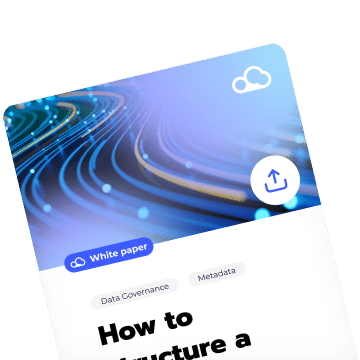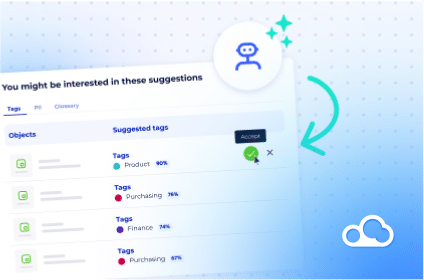Building a common business vocabulary is critical for fostering data-driven decision-making within an organization. That is why it is critical to have a Business Glossary to help with the process.
So, what is a Business Glossary, and what benefits does it provide for data professionals?
Business Glossaries defined
The Business Glossary is a tool that combines terms and definitions and presents them clearly and contextualized to help employees at all levels of the organization better understand data and its challenges. Business Glossary are data governance tools necessary for understanding an organization’s data and correctly conducting analyses.
A single repository that everyone can access
The Business Glossary is a collection of definitions for concepts used within the organization. These definitions are shared by everyone involved. Each member can add new information, update existing entries, and delete obsolete ones, allowing each department to standardize the terms it uses to describe data.
A good Business Glossary is a helpful tool for data-driven organizations. Without one, some terms may have multiple definitions, which can cause confusion and impede decisions. Creating a corporate glossary to use across the organization enables more time to be spent focusing on managing and analyzing data better.
What does a Business Glossary contain?
To standardize data vocabulary within an organization, the Business Glossary should include:
- Terminology and definitions: This is the core component of the Business Glossary. These definitions help users to better understand the ins and outs of each business term.
- Data categorization: This gives users the ability to search, identify, and find relationships between data based on their classification.
- Technical metadata: This metadata forms the link between business data and its technical implementations. As a result, data scientists can better interpret the data within a specific context.
Business Glossary: 4 Key Benefits
Data drives every business decision, and that’s why it’s so important to have a core set of terms in place to get everyone, from the executive team to the sales team, to speak the same language. Having this uniform approach to data across the organization is invaluable as it allows any member of your team to not only find the information they’re looking for but also understand what it means within the context of your organization.
Here are the key benefits of adopting a Business Glossary within your organization:
Facilitate communication between departments
With a Business Glossary, each department can quickly and easily find the definition of terms, which makes it easier to understand the data set and prevents confusion over business-specific data terms.
Build confidence to improve productivity
Users are more inclined to use data that they trust to make better and more efficient business decisions.
Reduce complexity
When the terminology associated with data is standardized, everyone can more effectively access and use the data. This simplifies the company’s day-to-day operations and relieves the data teams.
Facilitate data governance
A Business Glossary helps to eliminate team silos by outlining each stakeholder’s ownership and role in data governance. Each user is responsible for the management of business information and can be easily contacted by other employees.
Build a common data language in your organization
The Business Glossary brings together terms and definitions in a clear and contextualized manner to help employees at all levels of the organization better understand data and its challenges. Overall, it’s clear that there are many benefits to having a data glossary. Beyond facilitating change within your organization, a data glossary allows everyone within your company to be on the same page. It will help you train employees in better data management, and overall improve productivity throughout your entire business.
—
Are you ready to unlock the full value of your data? Start your DataGalaxy 15-day free trial or request a product demo to get started today!





